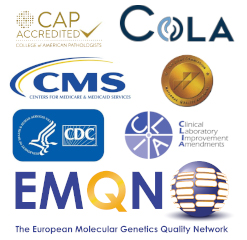Rare Cancers
WHY WE’RE DIFFERENT
EXCLUSIVE PARTNERS
- Perkin Elmer
- Sngene Lab
- Genique lifesciences

Rare Cancers
A rare cancer is defined as a type of cancer that has less than 1,250 new diagnoses in any one year or less than 6 incidences per year in a population of 100,000. [1] There are over 200 different types of rare or less common cancers (also known as RLC).[1]
A less common cancer is defined as one that has between 6 and 12 incidences per year per a 100,000 population. Examples of less common cancers are Brain Tumours, Thyroid Cancers, Liver Cancers, Pancreatic Cancers, Kidney Cancer, Testicular Cancer and many, many more. In fact, most cancers, except Breast, Prostate, Bowel, Lung and Melanoma, can be classified as rare or less common. [1]
There are hundreds of different types of rare and less common cancers and when combined they have a devastating impact on the community’s health and wellbeing.
What is Genomic Testing?
Genomic testing looks at the DNA of your tumour and identifies mutations that are unique to each person’s cancer. Once we have identified the specific problems, we can find targeted solutions to help fix them. Genomic testing provides a personalised approach to your cancer treatment, giving you the best chance of survival. Clinical trials of over 70,000 patients have shown that personalized therapy, based on genomic profiling of tumours, is the most effective way to improve outcome, with higher response rates, longer progression free and overall survival, and fewer deaths related to toxic effects across cancers. [3-4] Investing in genomic testing, to obtain a complete diagnosis and select appropriate therapy, is a small cost compared with the money and time that may be wasted on ill-chosen therapies. [4] Genomic testing provides a powerful diagnostic tool, and every patient with cancer deserves an accurate diagnosis.
The power of Genomic Testing for Rare Cancers
A comprehensive genomic analysis of your rare cancer tumor may provide information on potential therapeutics, likelihood of resistance to therapeutics, clinical trials and new treatments, you may be able to access, prognosis and disease progression tracking.
Given the breakneck pace of new drug discovery, new options may become available after your initial presentation or diagnosis. A comprehensive genomic analysis can be referred to as new trials and treatments become available, to determine if your cancer is likely to respond to the treatment being trialled in specific clinical trials.
What testing options are available?
Codex Pro Plus Solid Tumour Analysis
- The Comprehensive PlusSolid Tumour Analysis may detect DNA mutations and RNA fusions across >120 genes that are commonly indicated in a range of cancer types.
- Your personalised report will provide you with the genetic characteristics of your tumour, which may provide information on potential therapeutics, resistance to therapeutics, prognosis and clinical trialsor new treatments you may be able to access.
- This analysis also covers Copy Number Variations and Tumour Mutational Burden, which can indicate your likely response to Immune Checkpoint Inhibitors.
- Transcriptome sequencing may provide information in regard to gene expression changes within the tumour profile. Transcriptome profiling can measure the activity of thousands of genes at once, that can enable us to create an overall picture of cellular function.
- Gene expression profiles help assess the functional status of critical pathways. Sequencing can indicate up or down regulation of RNA pathways within the tumour, helping highlight additional drug targets and pathways, when used in conjunction with DNA sequencing.
- Transcriptome Analysis may also help confirm or corroborate tumour diagnosis in cases of diagnostically challenging tumours, such as tumours of unknown primary origin. Transcriptome Analysis can help predict the likely tissue or origin through gene expression, helping to improve diagnosis and classification. For patients who have been previously undiagnosed or incorrectly diagnosed, obtaining an accurate diagnosis through Transcriptome sequencing can potentially increase the number targeted therapies they can access for treatment.
References
- Rare Cancers Australia. (2019). Rare Cancers. Retrieved from https://www.rarecancers.org.au/page/1100/rare-cancers
- Cancer Australia. (2019). Rare and Less Common Cancers. Retrieved from https://canceraustralia.gov.au/about-us/news/rare-and-less-common-cancers
- Jardim, D. L., M. Schwaederle, C. Wei, J. J. Lee, D. S. Hong, A. M. Eggermont, R. L. Schilsky, J. Mendelsohn, V. Lazar and R. Kurzrock (2015). “Impact of a Biomarker-Based Strategy on Oncology Drug Development: A Meta-analysis of Clinical Trials Leading to FDA Approval.” J Natl Cancer Inst 107(11).
- Subbiah, V. and R. Kurzrock (2016). “Universal genomic testing needed to win the war against cancer: Genomics is the diagnosis.” JAMA Oncology 2(6): 719-720
